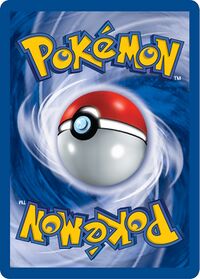Pokémon Trading Card Game: Difference between revisions
(→How to play: ***LEARN HOW TO PLAY BEFORE YOU WRITE HERE!!!!!!***) |
m (There were Arceus cards in the Advent of Arceus Deck) |
||
| Line 4: | Line 4: | ||
[[Image:JPCardback.jpg|thumb|right|200px|Back of an original Japanese language card]] | [[Image:JPCardback.jpg|thumb|right|200px|Back of an original Japanese language card]] | ||
[[Image:TCG Card Back Japanese.jpg|thumb|right|200px|Back of the current Japanese language card, since 2002]] | [[Image:TCG Card Back Japanese.jpg|thumb|right|200px|Back of the current Japanese language card, since 2002]] | ||
The '''Pokémon Trading Card Game''', abbreviated as '''Pokémon TCG''' or '''PTCG''', is one of the most popular and steady aspects of the [[Pokémon]] franchise (next to the video game and animated television series). The Pokémon TCG revolves around buying, collecting, and trading playing cards with various likenesses of Pokémon on them including some Pokédex information. At this time of writing, the TCG has at least one card for every Pokémon in existence | The '''Pokémon Trading Card Game''', abbreviated as '''Pokémon TCG''' or '''PTCG''', is one of the most popular and steady aspects of the [[Pokémon]] franchise (next to the video game and animated television series). The Pokémon TCG revolves around buying, collecting, and trading playing cards with various likenesses of Pokémon on them including some Pokédex information. At this time of writing, the TCG has at least one card for every Pokémon in existence. | ||
==History of the Pokémon TCG== | ==History of the Pokémon TCG== | ||
Revision as of 13:13, 2 August 2009

|
This article does not yet meet the quality standards of Bulbapedia. Please feel free to edit this article to make it conform to Bulbapedia norms and conventions. |
- This article is about the Trading Card Game itself. For the Game Boy game related to this game, see Pokémon Trading Card Game (game).
The Pokémon Trading Card Game, abbreviated as Pokémon TCG or PTCG, is one of the most popular and steady aspects of the Pokémon franchise (next to the video game and animated television series). The Pokémon TCG revolves around buying, collecting, and trading playing cards with various likenesses of Pokémon on them including some Pokédex information. At this time of writing, the TCG has at least one card for every Pokémon in existence.
History of the Pokémon TCG
The Pokémon TCG was created by Media Factory in Japan. It was first released in Japan in 1996. Wizards of the Coast, seeing a great opportunity to ride the new Pokémon wave, was licensed the game and introduced Pokémon TCG to North America in 1999. In 2003, Nintendo of America took over the game from Wizards of the Coast, and is currently releasing new sets for it. During the early part of its run, two Game Boy Color games were also released, Pokémon Trading Card Game and Template:Card GB 2, though only the first was released outside of Japan.
How to play
A person must build a deck of sixty cards using a combination of various "Pokémon" cards (creatures that do battle), "Trainer" cards (which have special effects on them) and "Energy" cards (a method of cost). To win, a player must take their six prize cards by "knocking out" their opponent's Pokémon creatures. A player can also win when their opponent no longer has any Pokémon creatures on the field, or if their opponent can't draw a card at the beginning of their turn.
Unlike classic card games which uses a single deck of 52 preset cards, trading card game (TCG) is constantly and continuously growing. New cards with new game abilities are released at a steady interval in order to keep the game fresh and alive. The only cost of TCG's, however, is that it forces a player to constantly keep in touch with the game, as well as having to purchase new cards from newly released sets. Players who don't keep up run the risk of falling behind other players. The Pokémon TCG requires a deck of 60 cards for standard or tourney play, while short matches can be held via 'half-decks' which consist of 30 cards instead. During a 60 card match, only four of any card (excluding Basic energy cards) is allowed in each deck to keep things fair and challenging. This is limited to two in a half-deck match.
Card types
Wizards of the Coast (English) sets
- Original releases
- Gym series
- Neo series
- Legendary Collection
- e-Card series
- Southern Islands
- Wizards Black Star Promos
- Best of Game Cards
Wizards of the Coast (English) unreleased sets
Nintendo (English) sets
Sets
- EX series
- δ Delta Species series
- Diamond & Pearl series
- Platinum Series
Other Merchandise
- EX Battle Stadium
- EX Series Value Pack
- 2004 World Championships
- 2005 World Championships
- 2006 World Championships
- 2007 World Championships
- 2008 World Championships
- Nintendo Black Star Promos
- DP Black Star Promos
Media Factory/The Pokémon Company (Japanese) sets
Exclusive Sets
- Vending Machine cards
- Video Introduction Set
- Neo Introduction Set
- Pokémon VS
- Pokémon Web
- Beat of the Frontier
- Advent of Arceus
Exclusive Decks
- e-Series
- ADV Series
- PCG Series
- DP Series
- DPt Series
Promotional Series
- Unnumbered Promotional cards
- "P" Promotional cards
- "T" Promotional cards
- "J" Promotional cards
- "ADV-P" Promotional cards
- "PCG-P" Promotional cards
- PLAY & PPP Promotional cards
- "DP-P" Promotional cards
- "DPt-P" Promotional cards
- Unreleased cards
External links
- Go-Pokémon Official English TCG Resource
- Pokémon-Card.com Official Japanese TCG Resource (Japanese)
- The PokéGym
- Pokébeach
- Pokémon Marriland
On Bulbagarden forums

|
This article is part of Project TCG, a Bulbapedia project that aims to report on every aspect of the Pokémon Trading Card Game. |


